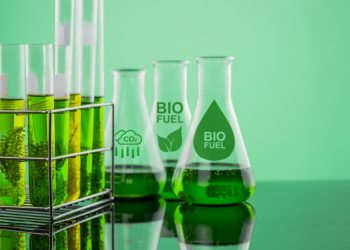During the COP26, sustainable cargo initiative GoodShipping has announced a new partnership with 18 companies that will substantially reduce emissions from shipping.
The Ship to Zero initiative brings together organisations spanning a range of nations and industries, including food production, consumer goods, chemicals, textiles, machinery and logistics, and all of which are united in their commitment to make an immediate and tangible climate impact.
The initial partners of the initiative are Bugaboo, Cocoasource, DHL Global Forwarding, Dille & Kamille, Dopper, Geelen Counterflow, Lenzing, Loods5, Lush, Matsen Chemie, Nine & Co, Regent Ingredients, Samskip, Sipsmith, Tony’s Chocolonely, YOGI Tea, Yumeko and Zaytoun.
The aim of the campaign is to demonstrate that making real climate impact is already possible today, and to provide an example to all the policy decisionmakers in Glasgow.
Today, these cargo owners and other partners have completed the first in a series of bunkerings of sustainable marine biofuel in this COP26-dedicated decarbonisation campaign that will cut around 4,000 tonnes of emitted CO2.
Each partner has committed to a specific reduction in GHG emissions related to the transport of their products or services.
GoodShipping has also completed the first bio-bunkering of the container ship Samskip Innovator, during which fossil fuels were replaced by 100% sustainable biofuels. The partnership will see biofuels used for a total of four or five trips from Rotterdam to Hull (UK), and around 4,000 tonnes of CO2 will be reduced as a result.
Because GoodShipping is based on the concept that all carbon is emitted into the same atmosphere, the vessel being refuelled will not necessarily carry the cargo that the partner companies have decided to transport carbon neutrally. The CO2 reductions can be enabled on another oceangoing vessel, with GoodShipping’s strict accountability criteria ensuring that the partners’ decarbonisation commitments are delivered.
The Ship to Zero initiative demonstrates that concrete climate action is possible now, and that a tangible impact can be achieved by taking small steps together and breaking down barriers to collaboration across industries. Given the urgency of the climate crisis, there is no time to waste, and cargo owners have a unique opportunity to move from intentions to action
Tina Trinks, Commercial Manager at GoodShipping, said.
Furthermore, Kathrin Brost, Global Head of GoGreen Program, DHL Global Forwarding, added that “this is a great, innovative way of showing that by joining forces we can make a difference and speed up the decarbonisation of marine shipping.”
In a similar development, Transport Day at COP26 started with the launch of Clydebank Declaration, which aims to support the establishment of zero-emission maritime routes between 2 (or more) ports.
Namely, the signatories of the Declaration will boost the development of at least 6 green corridors by the middle of this decade, while scale activity up in the following years, by inter alia supporting the establishment of more routes, longer routes and/or having more ships on the same routes.
Furthermore, a total of 14 countries have also signed a declaration during COP26, urging the IMO to take immediate action in order to achieve zero emission shipping by 2050.
More specifically, Belgium, Britain, Finland, France, Germany, Honduras, Hungary, Iceland, the Marshall Islands, Norway, Panama and Sweden, Denmark, and the US signed the maritime sector declaration, which commits countries to work at IMO to adopt goals for 2030 and 2040 that place the sector on a pathway to full decarbonization by 2050.

































































